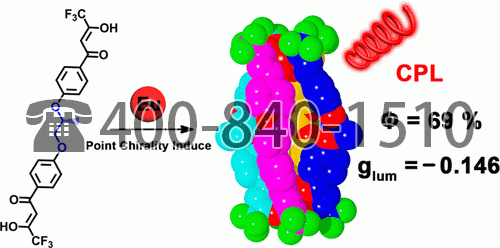Yanyan Zhou, Yuan Yao, Zhenyu Cheng, Ting Gao, Hongfeng Li*, and Pengfei Yan*
Abstract
Aromatic β-diketones have been extensively employed as highly effective sensitizers in luminescent lanthanide complexes. However, the difficulties to make the chiral modified groups effectively participate in the frontier molecular orbital (FMO) distributions limit their applications on lanthanide circularly polarized luminescence (CPL) fields. Considering the inherent chirality of the helical structure, a pair of enantiopure dinuclear europium quadruple-stranded helicates, ΔΔ/ΛΛ-(HNEt3)2(Eu2L4) (ΔΔ/ΛΛ)-1; L =?R/S-1,2-bis(4,4′-bis(4,4,4-trifluoro-1,3-dioxobutyl)phenoxyl)propane are assembled via a point chirality induced strategy. The comprehensive spectral characteristics combined with density functional theory (DFT) calculations demonstrate that the one point chirality at the spacer of the ligand successfully controls the Δ or Λ configuration around the Eu(III) ion center and the P or M helical patterns of the helicates. The mirror-image CPL and CD spectra further confirm the formation of the enantiomer pairs. As expected, the helicate presents a higher luminescence quantum yield (QY) of 68% and a large |glum| value (0.146). This study effectively combines the excellent sensitization capability of β-diketone and the helical chirality of helicates. This strategy provides an effective path for the synthesis of lanthanide material with excellent CPL performance.
DOI: 10.1021/acs.inorgchem.0c01911?#cplspectrophotometers?#circularlypolarizedluminescence?#olisspectrophotometers
[pdfjs-viewer url=”https%3A%2F%2Fydzhly.com%2Folisclarity%2Fwp-content%2Fuploads%2Fsites%2F7%2F2020%2F08%2Fic0c01911_si_001.pdf” viewer_width=100% viewer_height=1360px fullscreen=true download=true print=true]

